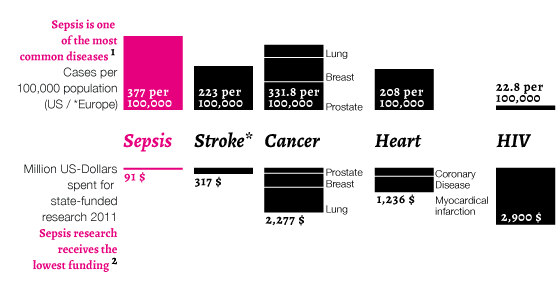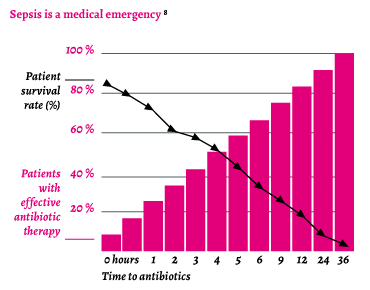Sepsis
Sepsis is one of the most common but least-recognized illnesses in both developed and developing countries.
What is Sepsis?
Sepsis arises when the body’s response to an infection injures its own tissues and organs. It may lead to shock, multiple organ failure, and death, especially if not recognized early and treated promptly. Sepsis remains the primary cause of death from infection despite advances in modern medicine, including vaccines, antibiotics, and acute care with hospital mortality rates between 30 and 60%.

Did you know?
That Sepsis is one of the most common diseases but sepsis researches receive the lowest funding.


That Sepsis is a medical emergency: without timely interventions, the patient survival rate falls dramatically to 0% within 36 hours. Early sepsis treatment is cost effective, reducing hospital and Critical Care bed days for patients. Unfortunately, sepsis is still mostly overlooked and recognized too late.
That the incidence of Sepsis is increasing dramatically due to the ageing population and despite the advantages of modern medicine including vaccines, antibiotics and intensive care. Hospitalizations for sepsis have more than doubled over the last 10 years. International and national surveys indicate that 20-40% of sepsis patients that require treatment in the intensive care unit developed sepsis outside the hospital. The incidence of sepsis developing after surgery trebled.
To learn more, download the Sepsis Fact Sheet

Sepsis Initiatives
The Centre for International Child Health, BC Children’s Hospital and the World Federation of Pediatric Intensive & Critical Care Societies (WFPICCS) entered a partnership in support of WHO’s resolution to improve the prevention, diagnosis and clinical management of sepsis.
Learn more about the Pediatric Sepsis Data CoLaboratory and join to be kept up to date on the latest developments of this exciting initiative.
World Sepsis Day an initiative from the Global Sepsis Alliance and its founding members, takes place annually on 13 September. An opportunity to educate yourself and others about sepsis.
Regional sepsis declarations are being created to address sepsis at a local level. Read more about the Kampala and São Paulo declarations and how you can support them.
World Sepsis Day is an initiative of the Global Sepsis Alliance and its founding members, all of whom are non-profit organizations. Each year on 13 September, sepsis advocates from all over the world organize various activities in their respective countries, like photo or movie competitions, information events, sporting events, and much more. Check out the event poster to get an overview over everything that happened last World Sepsis Day.
The Objectives of the GSA in General
GSA’s mission is best set out in the targets of the World Sepsis Declaration . The GSA wants to ensure that:
- The incidence of sepsis decreases globally by implementation of strategies to prevent sepsis
- Sepsis survival increases for children (including neonates) and adults in all countries through the promotion and adoption of early recognition systems and standardized emergency treatment
- Public and professional understanding and awareness of sepsis improve
- All patients worldwide get better access to appropriate rehabilitation services
- The measurement of the global burden of sepsis and the impact of sepsis control and management interventions improve significantly
Current Priorities
- Acknowledgement of a resolution on sepsis including official designation of World Sepsis Day (WSD) as one of the World Health Days by the World Health Assembly (2017)
- Recognition of sepsis in the Global Burden of Disease Report
- Increase public awareness and implementation of quality improvement initiatives
What You Can Do
If you are an individual or a hospital:
- Sign the World Sepsis Declaration
- Participate in the 1st World Sepsis Congress on September 8th and 9th, 2016. Connect and learn with leading sepsis experts around the globe – for free and from the comfort of your home or office! More information & registration: http://www.worldsepsiscongress.org
- Bring up the issue of sepsis whenever appropriate at all levels, building coalitions demonstrating a cohesive professional support for raising these issues within your country
- Address your government representatives/other stakeholders, especially your Ministry of Health officials, and ask them to support the resolution, for example by writing a letter of support to the secretariat of the WHA or to the Director-General of WHO
- Initiate quality improvement measures on a local, regional or national levels
- Join our Communication or Quality Improvement Committee
- Donate
- Subscribe to our newsletter
If you are an organization/society:
- Contact us and become a member of the GSA
For More Information
www.global-sepsis-alliance.org
Factsheet on Sepsis – short version
Niranjan Kissoon, MD
Acute and Critical Care Medicine
British Columbia’s Children’s Hospital
Department of Pediatrics, University of British Columbia
Email: nkissoon@cw.bc.ca

